Indigenous Initiatives at Laurier
June is Indigenous History Month in Canada
Search for academic programs, residence, tours and events and more.
June is Indigenous History Month in Canada

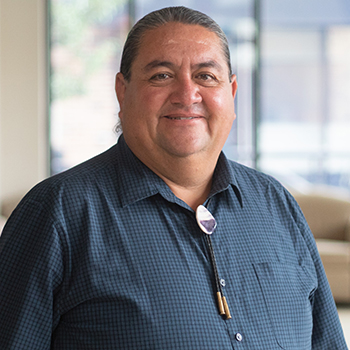
Dear Wilfrid Laurier University community,
June marks Indigenous History Month. At Laurier, this is a time for us to celebrate and recognize the contributions and scholarship of Indigenous faculty, staff, students, and alumni. It is also an opportunity for our community to reflect on and learn more about First Nations, Inuit and Métis languages, cultures and knowledges.
We recognize that there is a long history of government policy that sought to erase Indigenous history and knowledge and intentionally dismantle Indigenous communities and familial ties. Laurier has begun the long journey toward truth and reconciliation, in partnership with and under the guidance of the Office of Indigenous Initiatives.
The Office of Indigenous Initiatives continues to build and strengthen our staff team, to position our department to serve the Laurier student, staff, and faculty community as efficiently as possible. Our primary goal this year has been to develop an implementation strategy of the Indigenous strategic plan. We have met with several internal and external collaborators across Laurier communities that will enhance our relationships and build a vision for actioning Indigenization, decolonization, and reconciliation.
This month, we encourage you to learn more about Indigenous knowledge and world views. We are incredibly proud of what has been accomplished in our community, while recognizing there is much work to come. Thank you to our faculty and staff who engage in this work every day and thank you everyone in the Laurier community who has made a commitment to move forward in peace and reconciliation.
In peace and friendship,
Darren Thomas
Associate Vice-President: Indigenous Initiatives
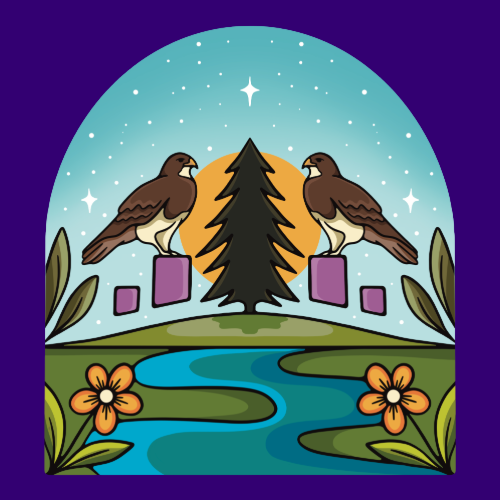
In September 2024, Laurier's Brantford campus hosted MarketFest: In Peace and Friendship, a two-day celebration of contemporary Indigenous thinkers, makers and musicians.
Free and open to the public, the event transformed the atrium at One Market into a marketplace of Indigenous vendors, curated by acclaimed Indigenous artist and Laurier alumna Alanah Jewell (BA ’19) of Morningstar Designs. Guests were also invited to attend public lectures on subjects ranging from local history to Indigenization at Laurier and take in live music from the Little Creek Singers, Six Nations Women Singers, Lacey Hill and James N. Wilson.
Hosting MarketFest in One Market was a step toward fulfilling Laurier’s commitment to restoring mutual benefit at this site for Indigenous and non-Indigenous peoples.
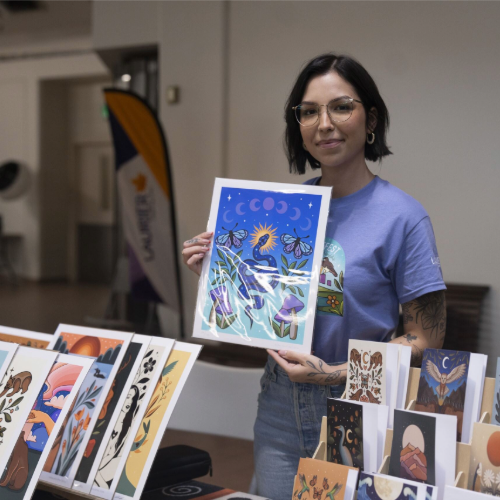
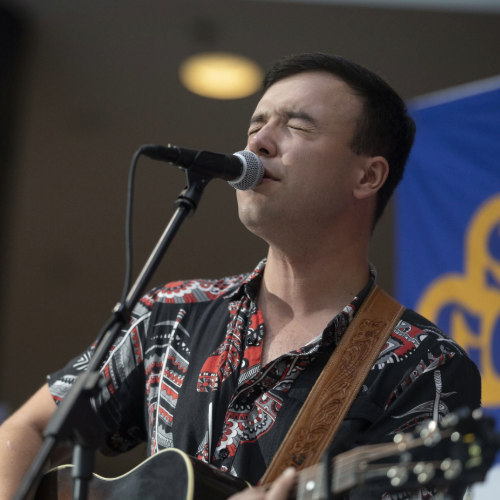
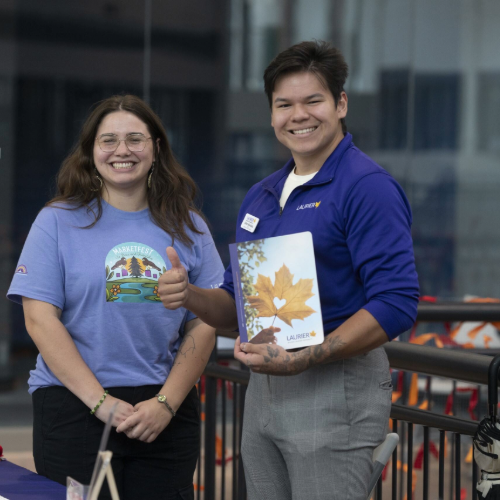
When Emma Labelle first arrived at Wilfrid Laurier University’s Brantford campus, she wasn't quite sure what path she wanted to take. Four years later, Labelle is set to cross the stage and receive her diploma at spring convocation – confident, focused and driven by purpose.
Raised in Sarnia, Labelle has roots in Henvey Inlet First Nation through her mother and her grandfather is Métis. “I want to see more traditional medicines and traditional healers working with Indigenous peoples in the healthcare system,” says Labelle. “There’s such a disconnect there. That way of healing is so important and needs to be more available. And I believe there are a lot of non-Indigenous folks who could benefit from this knowledge, too.”
Dawson Baptie, a Bachelor of Business Administration student, was one of 114 Indigenous graduates honoured at Wilfrid Laurier University’s Indigenous graduation celebration this spring. Held at the Gathering Place on the Grand on Six Nations of the Grand River Territory in Ohsweken, the event recognized fall 2024 and spring 2025 graduates.
Baptie crossed the stage to receive his Indigenous graduate stole – part of a tradition Laurier has carried on since 2022.
The celebration was especially meaningful for Baptie, who is Métis, but didn’t participate in events or programming hosted by Adjiwan Kaandossiwin Gamik – Laurier’s Waterloo campus Indigenous Student Centre – until his third year. “I guess I never felt comfortable, or ‘Indigenous enough’ to access those services,” says Baptie. “I felt like I didn’t want to take away from other people’s experiences.”
Wilfrid Laurier University Bachelor of Business Administration (BBA) student Chris Uvakov, a lover of the outdoors, always dreamed of visiting the Canadian North. He got his chance through a unique co-op experience as an economic development consultant in Sambaa K’e, Northwest Territories, a remote fly-in community of about 90 people almost 450 km from Yellowknife.
Community member Norma Jumbo helped Uvakov learn some of the traditional Dene Zhatıé language. “He just wanted to learn more and more and more – and that’s what we really liked about him,” says Jumbo. “He was so involved with our culture, our land and our language.”
For many Indigenous students, finances, family responsibilities and cultural commitments can create barriers to engaging in academic experiences away from home. A course offered by Wilfrid Laurier University aimed to change that. In August 2024, nine Indigenous students from Laurier travelled to Auckland, New Zealand as part of a two-week field course to learn about Māori culture.
Indigenous Student Services has partnered with Laurier's Sustainability Office to grow vegetables and herbs in an Indigenous sovereignty garden on the Northdale campus. The harvest is used in meals at the Indigenous Student Centre, and community members also braid sweetgrass to be used in smudging ceremonies.
Northdale community garden plots are available for free to students, staff and faculty.
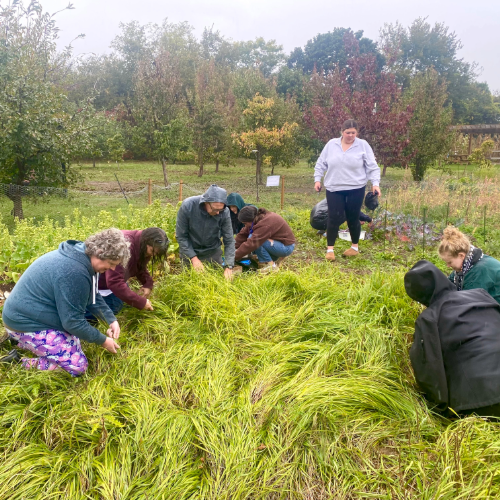
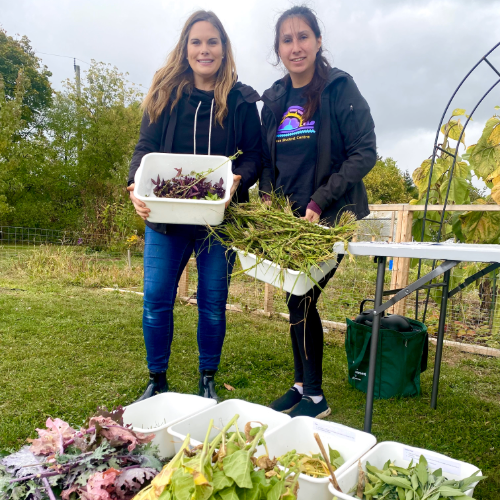
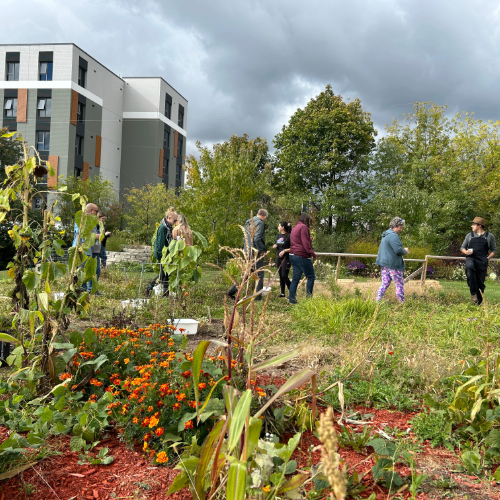
The Nature of Healing is the spoken truth of seven courageous people who survived the Mohawk Institute, Canada’s first and longest running “Indian Residential School.” From victim, to survivor, to activist – this is a story of resistance, resilience and healing.
In 2024, Laurier appointed local Indigenous writer Alicia Elliott as the Laurier Stedman Fellow. In this role, the best-selling author of And Then She Fell (2023) and A Mind Spread Out on the Ground (2019) served as a mentor for budding writers from Laurier and the broader community, who were invited to schedule one-on-one sessions for expert feedback on their work.
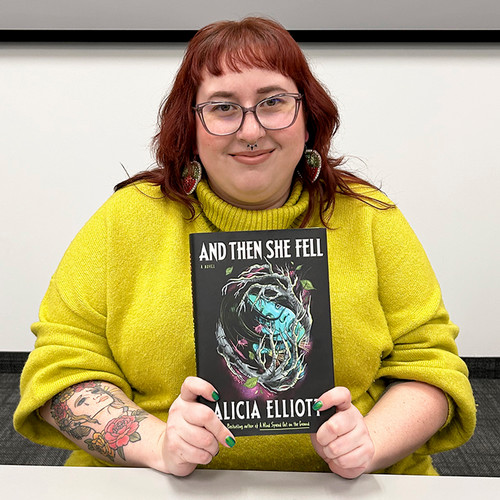
While studying History and Youth and Children’s Studies at Laurier’s Brantford campus, Cody Groat interviewed more than 30 famous Canadians and featured them in his book Canadian Stories.
After completing a master's degree in England, Groat returned to Laurier Brantford to begin a PhD and took on the role of President of the Indigenous Heritage Circle, a not-for-profit organization dedicated to advancing the cultural heritage priorities of First Nations, Inuit and Métis communities.
Groat’s current research explores his family’s history over seven generations, culminating in the life of his late father, examining broader themes of intergenerational trauma, Indigenous masculinities and the long-term effects of colonial policies like residential schools and the Sixties Scoop.
Jade Psutka will never forget the day she was told her mother had been adopted. Raised by a non-Indigenous family from a young age, her mother was in fact Haudenosaunee from Oneida Nation of the Thames. For Psutka, it was a pivotal moment in understanding her own Indigenous identity, her history, and its continued impact.
After earning her BA from Laurier Brantford and moving to Toronto, her interest in volunteering led her to Miziwe Biik Aboriginal Employment and Training, an organization that provides professional development and job opportunities for Indigenous community members in the GTA.
Read about Psutka and other outstanding Laurier Brantford alumni.
Discover the work of some of Laurier’s Indigenous researchers, along with collaborative research projects with Indigenous communities.
Researchers from Wilfrid Laurier University are collaborating with the Government of the Northwest Territories (GNWT) and the Territorial Agrifood Association (TAA) – a non-governmental, non-profit organization representing the NWT agrifood industry – to foster local food production and distribution.
The Weston Family Foundation honoured eight Wilfrid Laurier University graduate and postdoctoral researchers with 2024 Weston Family Awards in Northern Research. Weston Family Northern Scholars are encouraged to co-design their research with northern communities, with the goal of protecting and restoring biodiversity in Canada.
Ciann Wilson, an associate professor of Psychology at Wilfrid Laurier University, has been named the Canada Research Chair in Community-Based Research, Ethics and Well-being in recognition of her impactful research with and alongside equity-deserving communities.
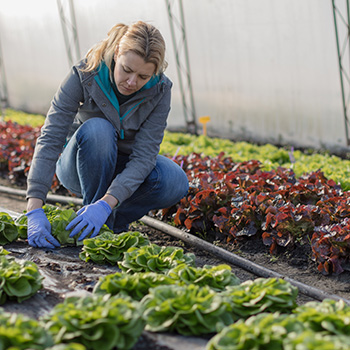

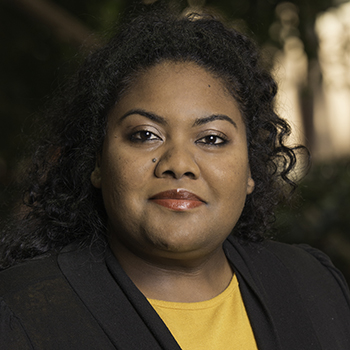
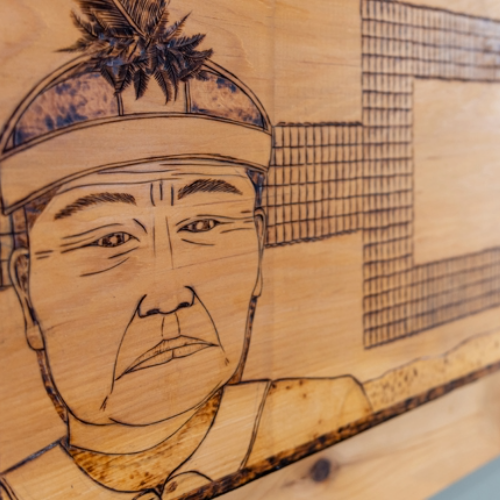
As a result of extensive consultations with Indigenous Elders, community members, faculty, staff, and students, Laurier’s Office of Indigenous Initiatives developed a university-wide Indigenization strategy that has been a core initiative of Laurier’s Action Plan for Equity, Diversity, Inclusion (EDI) and Indigeneity.
The Indigenous Strategic Plan was unanimously approved by the university Senate and Board of Governors in the summer of 2023.
This plan is informed by existing Indigenous scholarship on reconciliation and decolonization in the Canadian academy. It reinforces Laurier’s commitment to Indigenization and fostering a community that honors Indigenous knowledge and practices at Laurier. It also reflects Laurier’s belief that educational institutions have a duty to address the legacy of harm caused by colonial policies and practices.
Through Laurier Continuing Education, community members can learn about Indigenous history, knowledge and practices, and how systems in Canada have impacted Indigenous communities.
Explore courses and certificates offered through:
In partnership with the City of Brantford, Laurier developed a free online course to introduce members of the community to Indigenous peoples’ experiences, history and culture.
Learn more and register for Introduction to Indigenous Matters.
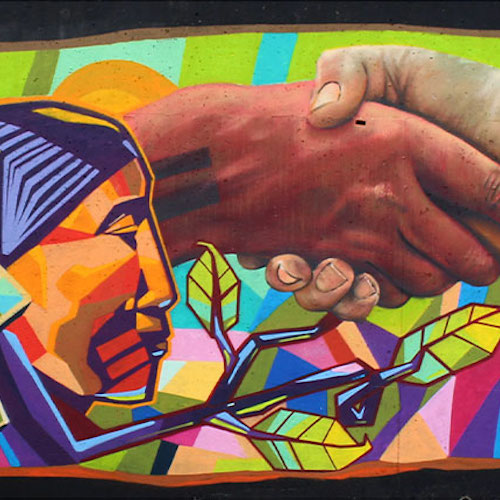
The Office of Indigenous Initiatives (OII) is responsible for leading Indigenization at Laurier, a priority in the Laurier Strategy that involves fully integrating Indigenous knowledges and practices at the university.
The OII also provides oversight to Indigenous Student Services, whose mandate is to build a positive student experience for Indigenous students, provide community for students and support them in culturally appropriate ways during their time at Laurier.
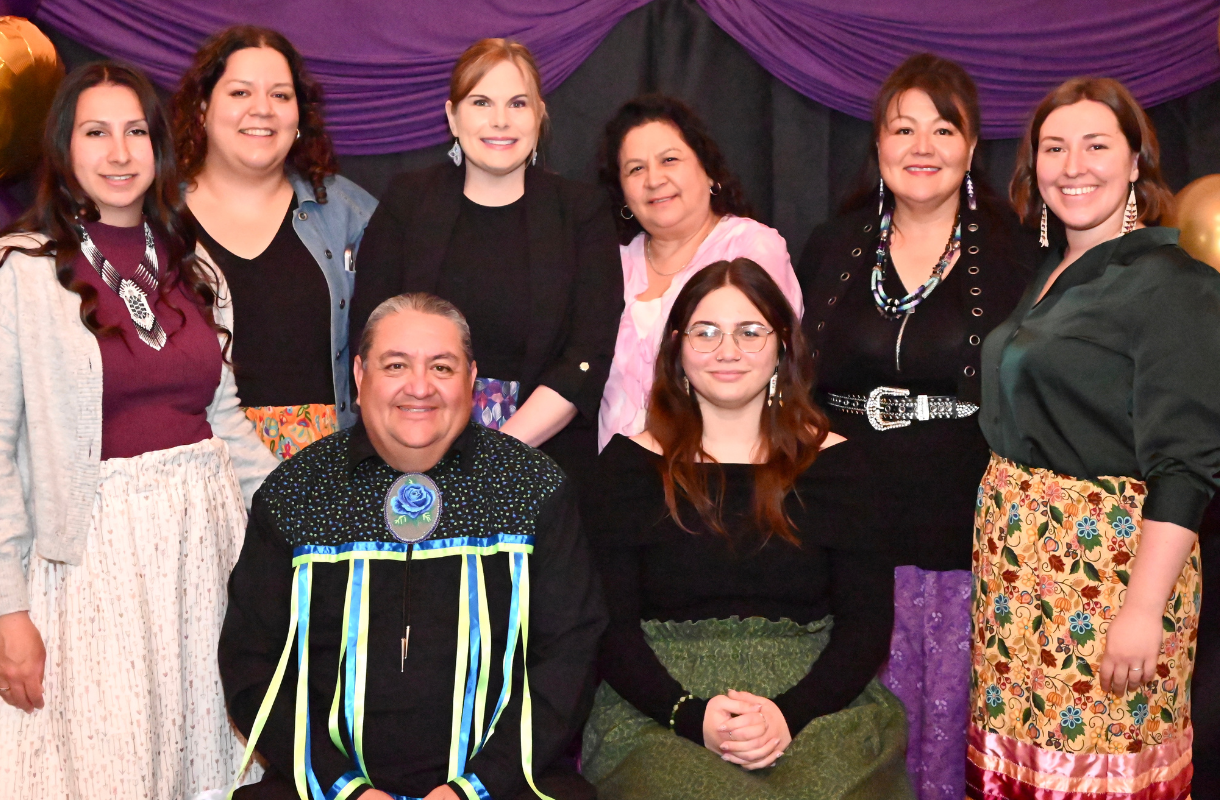
The Indigenous Student Centres (ISC) on the Brantford and Waterloo campuses serve as the hub for Indigenous students. Whether you are looking for a space to study, hang out with friends, or continue on your journey of identity through cultural programming – the ISC has got you covered.
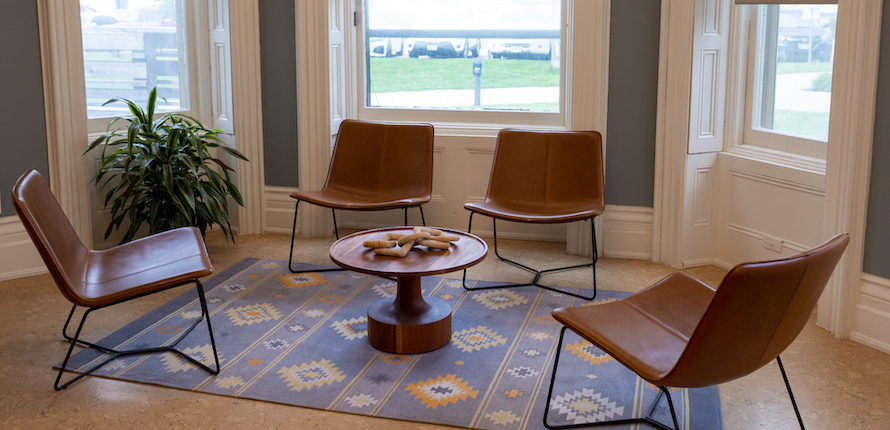
In Brantford, the generous support of the Grundy Family helped renovate Onkwehonwè:ne Brantford Campus.
This enhanced Indigenous Student Centre creates a larger supportive and nurturing space for Laurier’s growing Indigenous student community, allows for much-needed staff and programming expansion, and increases vital access to academic programs and assistance with career development to further enhance employment options for Indigenous students.
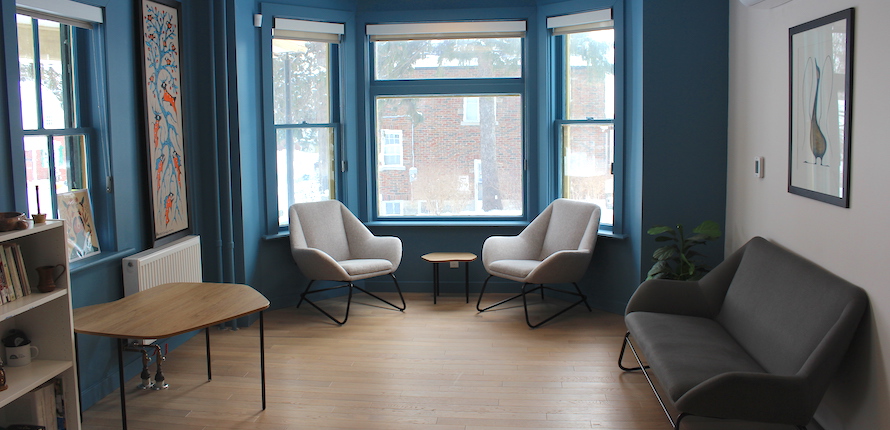
Thanks to generous philanthropic investment, Lucinda House was renovated into an enhanced Indigenous Student Centre on Laurier’s Waterloo campus. This beautiful space provides a place where Laurier’s Indigenous student community can participate in ceremony and activities; where Laurier can demonstrate its commitment to Indigenous culture and learning, and to Indigenous students’ success; and where Indigenous students can find a “home away from home.”
Laurier offers gratitude to the Lyle S. Hallman Foundation, the Students’ Union, the Wilfrid Laurier University Alumni Association, Ken Flood and the Wilfrid Laurier University Graduate Students’ Association for their significant gifts in support of this project.
The Indigenous Student Emergency Fund is one part of the Indigenous Student Services’ circle-of-care approach to supporting Indigenous students at Laurier. Support staff at the Indigenous student centres work one-on-one with students to ensure they have access to the unique resources, support, and community they need to succeed in their studies and thrive at Laurier. This multi-campus fund is available to provide relief to Indigenous students facing unexpected financial crisis, no matter where they’re studying from.
If you are in a position to do so, please consider donating in support of the Indigenous Student Emergency Fund in honour of this National Day for Truth and Reconciliation. Thank you for your generosity.
In 2015, the Truth and Reconciliation Commission (TRC) of Canada recorded testimony of more than 6,000 survivors affected by residential schools. These testimonies were published in a report detailing the experiences and impacts of the residential school system, creating a historical record of its legacy and consequences. Read The Survivors Speak for the Survivors’ stories and lived experiences.
An outcome of the TRC’s report into the history and legacy of the Canadian residential school system was this document detailing 94 calls to action across a wide range of areas including education, health, child welfare, and culture.
The residential school’s crisis line is available 24 hours a day for anyone experiencing pain or distress as a result of a residential school experience. Support is available at 1.866.925.4419.